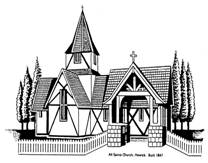
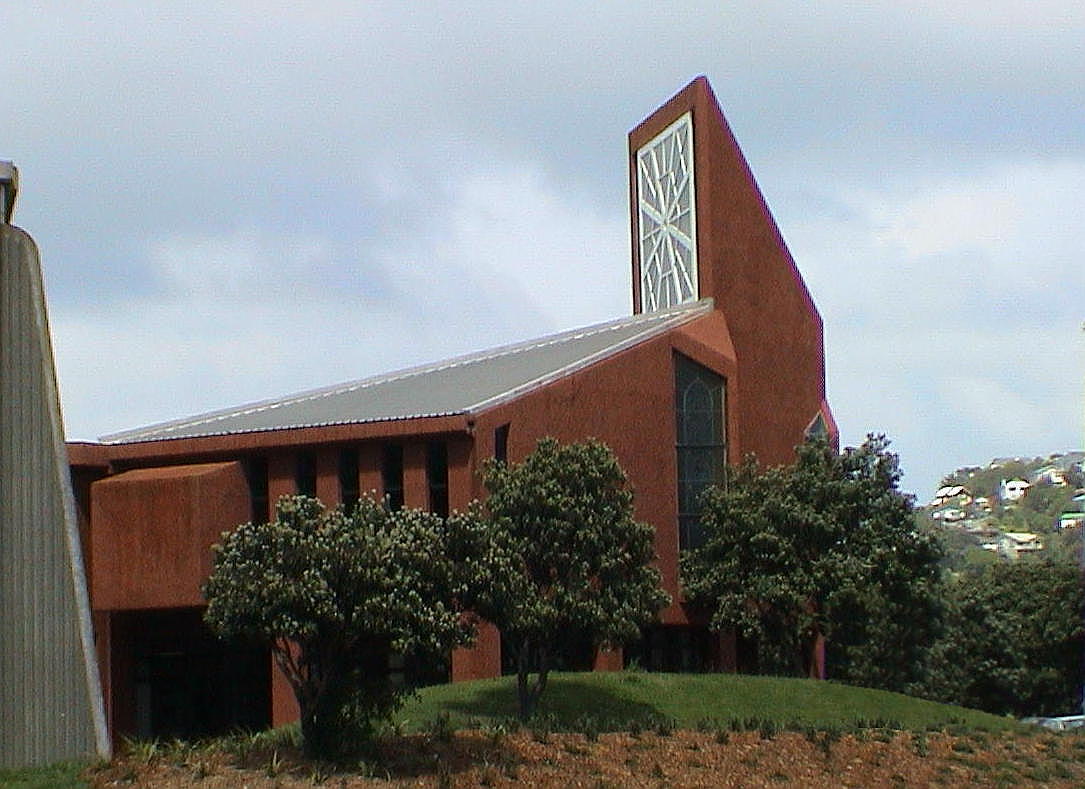
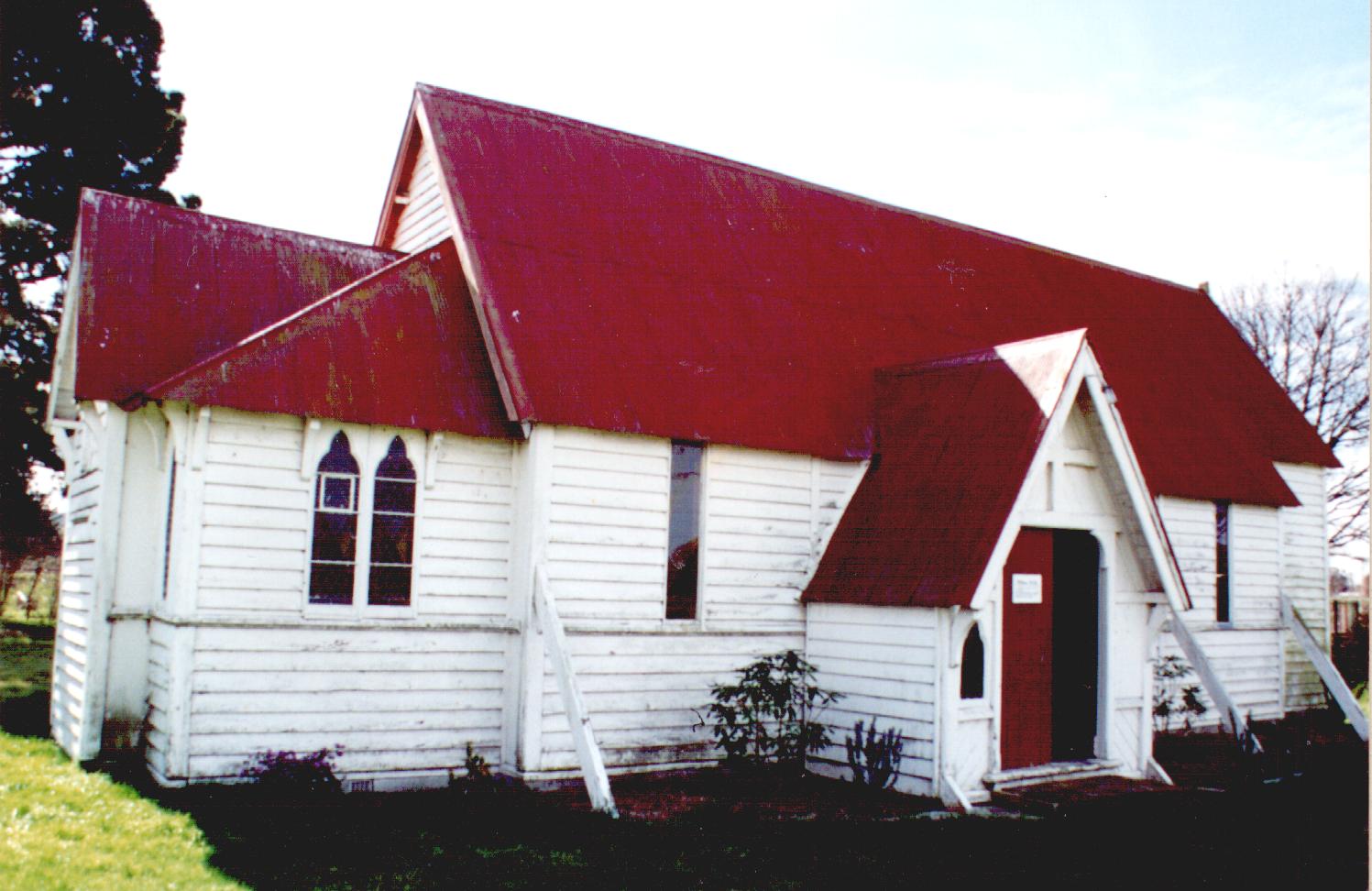



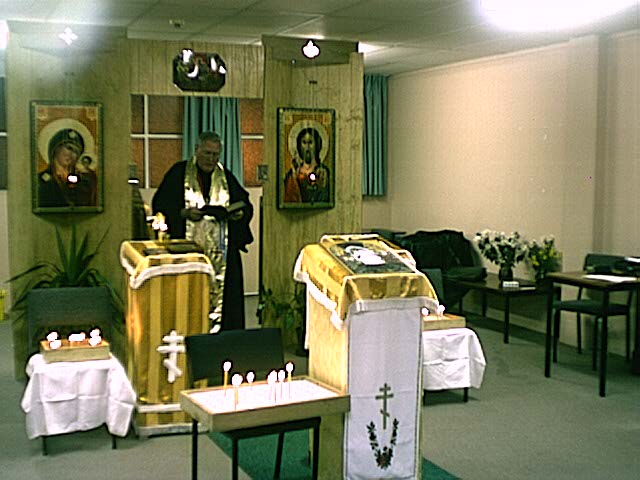
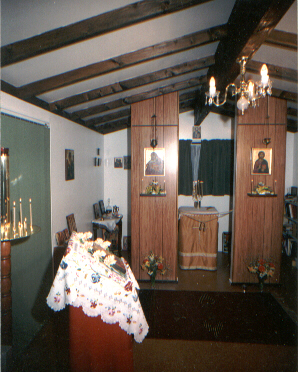
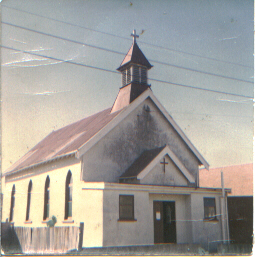
It is a matter of regret that SPOTLIGHT has not appeared since Lent, 2002. That was the last issue for which the old front page was used, and for a sad reason. Our first mission after S. Michael's parish, begun in 1976 and established by Bishop Gibran in 1978 under the name of S. Ignatius, is no longer with our Archdiocese. Its photo no longer appears on our front page. We can only hope and pray that Fr Michael and his people will be able to find a viable arrangement for their future in due course. There is no need to say any more about this unfortunate event, which came shortly after the other centres gathered in Wellington for a weekend with our Metropolitan which saw our clergy augmented by three, with two ordinations..
Time was also devoted at that meeting to the legal incorporation of our Archdiocese in New Zealand, and the results are being put into effect. Meanwhile the new parishes' accounts are being held as an appendage to the account operated in Rangiora, and a spreadsheet is being maintained which shows all the parishes at a glance the financial state of all the parishes. This is very significant as a symbol of the mutual trust and co-operation among the communities. The cohesion of our Church in New Zealand was further supported when His Eminence declared in June, 2003 that New Zealand is a Deanery within the Archdiocese; and he most kindly appointed me Dean. I have been asked whether this means that the Community Church at Ashley has become a Cathedral. I do not know; its official status is as a Community Church available to all churches and administered by a Residents' Committee. It is worth reminding people of this, as when we made use of a map of Ashley for directions on the website we found the printer had labelled the Church: "Greek Orthodox". An Orthodox centre of worship it is, but the building does not belong to us, but to the Trustees. In any case, we may presumably say that the rectory has become a deanery.
My website http://homepages.paradise.net.nz/ was always meant to be transitional until an official NZ website could be set up. In the last few weeks this has been done, and we are grateful to Fr Dr Ian Nield and to Mr Kamil Daria for the technical work. Not all bugs have been corrected yet, but considerable material is being transferred there or newly written. The 10 MB on my pages had been filled some time ago, and material could only be added by removing something. The new site www.antiochian.org.nz/ will have no such problems: while loading files I have noticed that the remaining capacity is between 11 and 12 GB.
SPOTLIGHT was for many years produced by typewriter and photocopier. In recent years it has been computerized, and then displayed on-line. The fact that we now have six centres of worship in New Zealand, and one in each of the 4 main cities, will be celebrated by a special new front page here, but also, and I hope soon, by a printed edition, (folded A3) of which at least the outside will be with photos in colour. Thanks to the generosity of Almighty God and of our people, we are able to raise our standards yet again.
With the same equipment I have begun a project which was urged on me: to make a new edition of the Divine Office as used at Ashley for the last 20 years. This was also typed and photocopied; it is now possible to have booklets, or books, printed in red and black and with music in the traditional neumes. The digital results of this are appearing on the new site as they are completed, under the URL: www.antiochian.org.nz/write/printtexts.html, or by following the links provided. Interest has been expressed from several directions, and the files are arranged so as to be able to be downloaded by visitors and printed out on a home printer. If I am spared to complete this project, correspondents in North America are interested also in a new edition of the Monastic Office and of the Missal. We shall see.
In time, all the information concerning our Church will be moved to the Deanery website. My site will keep some Church information, but will concentrate on local and family matters.
St Ambrose:
Lesson v
WHAT
shall I say of the Maccabees? But let me first tell you of their fathers.
When they were prepared to fight for the temple of God and for their rights,
by a wicked trick of the enemy they were attacked on the sabbath, and they
chose rather to offer their unarmed bodies to be slain, than to fight back
and thus violate the sabbath; therefore they all went gladly to their death.
But the Maccabees thought over these things and realized that the whole
nation might perish by following this example: therefore they decided that
if the enemy should attack them, even though it were the sabbath, then
they would avenge the murder of their innocent brethren. Whence afterwards,
when Antiochus was enraged and made war through his generals, Lysias, Nicanor
and Gorgias, he was utterly defeated with all his power, together with
his eastern and Assyrian forces, so that forty eight thousand men were
overthrown bv three thousand.
Earlier, they had to learn that they were to worship God only, and no other gods. They were very stubborn about learning that lesson; under Jezebel, they served the gods of the heathen tribes, especially Baal, the god of the Phoenicians. In spite of the dramatic miracles of Elijah, they relapsed over many generations until finally God caused them to be carried away into Babylon into captivity. When they were allowed to return, 10 tribes did not return, only those of Judah and Benjamin. They found in the Holy Land the Samaritans, remnants of those who had not gone into captivity, who had mixed their faith with that of the heathen tribes. This time they had learned their lesson, and they took it even further: they turned down the offer to help them rebuild the Temple. They were not going to mix with the heathen, not even with semi-heathen, even though these semi-heathen were also semi-believers; what we would call semi-christians or heretics.
The period of the Maccabees saw that determination put savagely to the test. Maccabees I and II are called "apocrypha" by some, but the Book of Daniel was written in that same period. The Book of Daniel got into the Hebrew canon because the author cast his story back to the time of Daniel, during the captivity, and because both ends of the scroll were translated back into Hebrew, while the middle was left in Aramaic. Maccabees I and II, however, were written in Greek, and considered to be of later date.
The book of Daniel tells of the same period in the form of vision and prophecy. It was a time when the Greek followers of Alexander tried to impose pagan greek customs on the Jews. The worst part of it was when Antiochus Epiphanes placed a heathen statue on the altar in Jerusalem. The Roman Emperor did something similar just after the Church began. One each occasion it stood there for three-and-a-half years. This time is referred to cryptically in Daniel and in Revelation. Both speak of "time, times, and half a time"; that is, "a year, two years, and half a year"; and this phrase has become a sort of emblem for the reign of evil.
And as I read this again this morning, I thought of our dear Fr Ilyan, on his own in the Forum of the CCANZ. We met yesterday, but this morning our Mass is preventing me from getting there until it is over. We prepared a contribution to be made this morning on the future of the ecumenical movement in NZ, even though we do not expect it to be much listened to. In the past Fr Ilyan, who represents us as one of the presidents of the CCANZ, has always gone home for the Sunday to fulfil his duty to God and his people. This time he could not; so while we sing away here (a little more strongly than usual, I thought?) we are offering the holy sacrifice not only on our own behalf, but for him, and for his Dunedin parish. He is reduced to taking Holy Communion privately in his room, and Dunedin gets no service, because the CCANZ is run by people who perversely think that the way to promote Christian Unity is to make people turn their backs on Jesus in the Eucharist.
My personal opinion is this: in the 1920s, some protestant churches got together to talk about unity and found they had a lot in common. Later, the Orthodox and then the Catholics became involved, but the original mindset of the ecumenical organizations continued dominant. Until the 60s, it could truly be said that even this wider collection held many beliefs in common. But since then, in the original mainstream protestant churches, basic doctrines were undermined one by one until today there is far less agreement than when it all began. The CCANZ meetings contain many people whom I have known since the 1950s. If they have changed at all, it is in giving up beliefs that we once agreed on.
So what should we be doing? Some think we ought not to be there. The Catholics have left, the Serbs have left. Fr Seraphim Rose said strongly that just being there is taken as giving in to the heretical agenda; that seemed very strong at the time, but now, 20 years after his death, his words are sounding less extreme and more prophetic.
Because the "ecumenical" movement is not just involving us with "semi-christians" now. There is increasing talk of unity with non-christian religions. It is not just a matter of letting the Samaritans help us rebuild the temple; it has got beyond that; we are facing the same pressures as did Elijah with the prophets of Baal, and as the Maccabees did with the Greeks, whose religious liberal tolerance was so unyielding that those Jews who kept the sabbath were slaughtered on it; and those who would not eat pork were roasted alive.
I think at least that if any of us has to enter an "ecumenical" arena in obedience to our church's membership and involvement, we should always take care to go surrounded by the explicit prayers of our fellow-believers of the Orthodox Church. Anything less is really not quite safe. And that is why I have focussed our prayers on Fr Ilyan this morning: a true Daniel in the lions' den.
First Pix from Easter 2003:
Fr Ian in Wellington, and Fr Victor and Fr Jack in Christchurch.
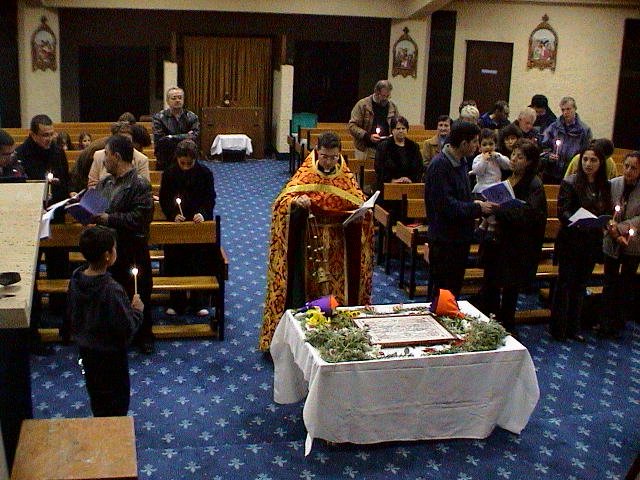
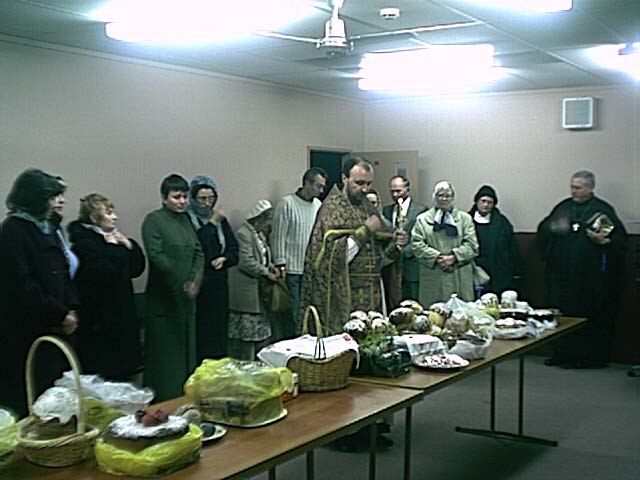

Thanks to Dr Tsipouras and Professor Shilov for sending these photos
so promptly.
Theosis - the goal of all Christians
Throughout the year and especially in
this season of Lent, we are asked to pray, fast and repent. Why are
we asked to do this?
In the Divine Liturgy the priest
prays: “...so that those who partake of them may be given... communion
of the Holy Spirit, fullness of the kingdom of heaven...”
The words “communion of the Holy Spirit, fullness of the kingdom of heaven” echo the message that is in John 1:12 “the right to become the children of God”. The process is called “theosis” or “deification”. Theosis is the mysterious joining by Divine Grace (God's uncreated energy) of a created being to the Creator. In the words of Saint Irenaeus: “For this is why the Word became man, and the Son of God became the Son of man, so that man, by entering into communion with the Word and thus receiving divine sonship, might become a son of God.” Saint Athanasius states it more directly: “For the Son of God became man so that we might become God”.
What a statement! What a promise! God became Man, so that we can become God! The Church Fathers base their teachings on theosis from scripture. The quote from John's Gospel above is an example. Another example is 2 Peter 1:4 “by which having been given to us exceedingly great and precious promises, that through these you may be partakers of the divine nature, having escaped the corruption that is in the world through lust” (NKJ translation). Other examples are in Romans 8:29, 1 Cor 13:12, 2 Cor 3:18 and 1 John 3:2.
In making our decision to follow Christ
we participate as creatures in God's very nature through the uncreated
divine energy we call Grace. In participating in God's nature we do not
take on the essence of God. The Church Fathers likened the process
to steel thrust into a furnace. The steel becomes hot. It glows and takes
on the characteristic nature of the fiery furnace. The steel does not become
the essential furnace it remains steel. The soul undergoing theosis is
filled with God, permeated with divine light, life, glory and love. No
change or confusion takes place between the uncreated substance of God
and the created substance of humanity. The deified soul conforms to the
divine will, while being neither obliterated nor rendered passive.
We only participate in divinity.
The process of theosis does not
make any created being worthy to receive divine worship. Only the
Triune God is worthy of divine worship. No other person, whether that person
be a Saint, an Angel or even Our Lady - the Theotokos - is eligible to
receive divine worship.
This Sunday, the first Sunday of Lent, is proclaimed as the “Sunday of Orthodoxy” in the Church. This was first instituted in 842 to mark the defeat of iconoclasm and proclaimed the legitimacy of the veneration of icons.
As stated at the second council
of Nicea, the use of icons:
“...Confirms that the incarnation of the Word of God was real and not imaginary,
and to our benefit as well, for realities that illustrate each other undoubtedly
reflect each other's meaning... we rightly define with full certainty and
correctness that, like the figure of the precious and life-giving cross,
venerable and holy images of our Lord and God and Saviour, Jesus Christ,
our inviolate holy Mother of God, and the venerated angels, all the saints
and the just, whether painted or made of mosaic or another suitable material,
are to be exhibited...”
Icons signify Christ, who is glorified in them. In the icons we manifest the “cloud of witnesses” (Hebrews 12:1) who participate in our salvation. Through icons it is man “in the image of God”, finally deified “into his likeness”, who is revealed to our faith.
We know that we are following the path to theosis when we are bearing the fruits of the Spirit. Following scripture, the Church teaches us that to be on the path and stay on the path we must pray, fast and repent.
In this season of Lent, let us recommit ourselves to our journey with Christ, to our personal theosis, through prayer, fasting and repentance.
The Sharon government is widely regarded, even
by Israel's friends, as a negative force in the current politics of the
Middle East. Its brutal repression of the Palestinians, its intransigence
over engaging in the peace process and its defiance of world opinion on
such matters as settlement expansion and the separation wall has alarmed
everyone concerned with this issue. Seldom before has Israel provoked such
criticism from friend and foe alike, and there is a feeling that a different
Israeli leadership, drawn perhaps from the Labour party and the Zionist
left, would restore the previous status quo. Such a new leadership could
be expected to re-start the peace process and offer the Palestinians something
more satisfactory and all
this would lead to peace and stability.
This widely held view ignores the real problem. As a Zionist, Ariel Sharon is as faithful and committed a servant as the Jewish state could ever have hoped for. He has merely followed the tenets of Zionism to their logical conclusion. It is not he who should be castigated but the ideology he and the state of Israel espouses. For those who have forgotten or never understood what Zionism was all about, a spate of recently published pieces will make salutary reading.
The most remarkable of these is an interview with the Israeli historian, Benny Morris, that appeared in the Israeli daily Haaretz on January 4th 2004, followed by a second article by Morris in the January 14th edition of the London Guardian newspaper. In these he explains with breathtaking candour what the Zionist project entailed.
Few Zionist outside the ranks of the extreme right have been prepared to be so brutally honest and Benny Morris claims to be on the political left. More significantly, it was he who first exposed the true circumstances of Israel's creation. Using Israel State archive documents for his groundbreaking book on the birth of the Palestinian refugee problem published in 1987, he was hailed as a courageous 'revisionist historian'. His work suggested to many that, having learned the facts of the case, he was bound to be sympathetic to the Palestinians. In the last few years, however, he has been expressing ever more hardline views, as if he regretted the pioneering research that helped expose the savage reality of Israel's establishment. This shift seems to have culminated in his most recent utterances about the nature of Zionism. Unpalatable as these are, we must thank him for saying so bluntly what all Zionists, however 'liberal', at bottom really think but do not say.
Right from Israel's inception Western states have been prepared to swallow this ideology, since they were not its direct target. But for Arabs, it was different. There was a time when they understood Zionism to be the basic cause of the Arab - Israeli conflict. From the 1920s onwards, the Palestinians, being the ones most targeted, feared that Zionism would take over their country. They tried to fight it but failed and the Zionist project took hold. As this happened, the other Arabs joined the fight and it was commonplace to hear Israelis being called simply, 'the Zionists' and Israel, 'the Zionist entity'. People wrote tracts, articles and books about Zionism and it seemed a black and white issue.
But after the 1967 war, a new ambiguity appeared. Resolution 242, accepted by the Arab states, introduced the idea that the basis of the conflict was the Israeli occupation of post-1967 territory, without reference to what had gone before. This set the pattern for all subsequent Arab-Israeli peace proposals which aimed to bring about Israeli withdrawal from these territories in exchange for Arab recognition. The first successful application of this principle was the 1979 Camp David Agreement between Israel and Egypt in 1979, trading Israeli withdrawal from Egyptian territory occupied in 1967 for a peace treaty. By the time of the 1991 Madrid peace conference, the (post-1967) land-for-peace formula was firmly established. Madrid involved the Arab front-line states only, but in the March 2002 Saudi peace proposal, the offer had been upgraded to one of Israeli withdrawal from all the 1967 territories in exchange for normalisation of relations with the whole Arab world.
Meanwhile, the Arab stance towards Israel as an illegitimate body forcibly implanted into the region whose ideology, Zionism, inevitably meant aggression and expansion to the detriment of the Arab world, quietly slipped out of view. Now, it was only Israel's post-1967 occupation that was the problem and, once rectified, Israeli integration into the region could proceed. The Palestinians had a clearer view of Zionism. In 1969, the PLO propounded a vision of a democratic state replacing Israel that would give equal rights to all its citizens, Muslims, Christians and Jews. This was a direct challenge to the idea of an exclusive Jewish state, but more importantly a refusal to acquiesce in the Zionist theft of 1948 Palestine.
However, the huge power imbalance between the parties forced the PLO to modify its stance and by 1974, a decision was taken to accept much less. The two-state solution was born and in 1988, the PLO formally recognised Israel in its 1948 borders. By 1993, the PLO had signed up to the Oslo Agreement that finally legitimised Zionism. The terms of the agreement excluded any discussion of 1948 Israel and confined themselves to the dispute over the 1967 territories. And by accepting these terms, the PLO signalled its acceptance of the original Zionist claim to Palestine. This process has found its apotheosis in the recent Geneva Accords, which require the Palestinians to recognise Israel as 'the state of the Jews'. No greater turnabout in history could be imagined.
Accompanying this evolution of attitudes has been a sort of Arab flirtation with Zionism. Following the Israel-Egypt treaty, a number of Arab-Israeli projects and initiatives came into being. These were mirrored in the West during the 1980s, where various Arab-Jewish 'dialogue groups' sprang up and the breaking of traditional taboos became enticing. Exchanges between Araband Israeli scholars and academics became popular and after the Oslo Agreement numerous Israeli-Palestinians joint projects were initiated.
Contacts between several Arab states
and Israel were made, either officially or in secret. Even previously hardline
anti-Israel states like Libya and Syria have started to make overtures
towards Israel, (though admittedly with mixed motives). The majority of
these initiatives have nvolved 'liberal' Zionists, not the small minority
of radical but marginalised anti-Zionist
Jews. It is as if the old antipathy towards Zionism as the root cause
of the Palestinian tragedy and the turmoil in the Middle East had been
forgotten. Like Marxist terminology in the West today, the anti-Zionist
rhetoric so prevalent amongst Arabs in the past, is passé and many
believe that Zionists are people you really can do business with.
At this point, Benny Morris's revelations are like a slap in the face. He reminds us that Israel was set up by expulsion, rape and massacre. His recent researches, cited in the new edition of his book, The Birth of the Palestine refugee problem revisited, provide the authentic evidence. The Jewish state could not have come into being without ethnic cleansing and, he asserts, more may be necessary in future to ensure its survival. Force was always essential to the imposition and maintenance of Israel, he explains; native hostility to the project was inevitable from the start and it had to be countered by overwhelming strength. The Palestinians will always pose a threat and they must therefore be controlled and "caged in". He recognises that the Jewish state project is an impossible idea and that, logically, it should never have succeeded. Nevertheless, it was worthwhile because it was a moral project justified, despite the damage it caused, by the overriding need for a solution to Jewish suffering. The Arabs in any case have a tribal culture, he says, "with no moral inhibitions" and "they understand only force". Muslims are no better. "There's a deep problem in Islam in which human life doesn't have the same value as it does in the West, in which freedom, democracy openness, and creativity are alien."
These utterances capture the essence of Zionism: that a Jewish state could never have been established without force, coercion and ethnic cleansing; that its survival depended on superior power to crush all opposition; that it was fired by a conviction of its moral rightness which accorded Jews a special place over others; and because of this, viewed everything as instrumental to its goal. Morris regrets the Palestinians suffering entailed in Israel's creation, but sees it as a necessary evil in pursuit of the greater good. "The right of refugees to return to their homes seems natural and just", he says. "But this 'right of return' needs to be weighed against the right to life and well-being of the five million Jews who currently live in Israel."
Thus he eloquently shows why Zionism is a dangerous idea: at its root is a conviction of moral righteousness that justifies almost any act deemed necessary to preserve the Jewish state. If that means nuclear weapons, massive military force, alliances with unsavoury regimes, theft and manipulation of other people's resources, aggression and occupation, the crushing of Palestinian and all other forms of resistance to its survival, however inhuman - then so be it. The truth is of course that the problem for Zionism was always how to keep Palestine without the Palestinians. And hence today's Israeli anxieties about the so-called Palestinian 'demographic threat'. As the impasse of ending the intifada, despite draconian suppression, persists, there is a near panic over 'demographic spill over' diluting Israel's 'Jewish character'. Limor Livnat, Israel's education minister, put this eloquently in a radio interview. "We're involved here," she said, "in a struggle for the existence of the State of Israel as the state of the Jews. Israel is not a state of all its citizens". The Palestinian prime Minster's recent (tactical) proposal of a binational state has only increased the panic. Opinion polls show that 57 per cent of Israelis support transferring the Arabs (Haaretz, 31.12.03) and government ministers like Avigdor Liebrman advocate this idea quite openly.
It is against this background that the monstrous barrier wall being erected in the West Bank can be understood. Hence also Ariel Sharon's offer last December of a 'unilateral' withdrawal from 40 percent of the West Bank, reversing the classical Likud position on keeping all of the land. A January opinion poll showed that 60 per cent of Israelis supported this. In similar vein, his hardline deputy Ehud Olmert, has proposed a partition of the land, including Jerusalem, into two states "because of demography" But that problem exists inside Israel too which is currently 20 per cent Arab and increasing. It is estimated that by 2010, there will be an Arab majority in the area of Israel/Palestine. How will the Zionists stem the tide and keep the state Jewish?
If Zionism is to remain, there are few choices. As Morris says, only by building an 'iron wall', by eternal vigilance and superior force to overcome 'the barbarians who want to take our lives'. The two-state solution is only a stopgap because he thinks the Palestinians will not be satisfied and sooner or later, they will destroy the Jewish state. Ariel Sharon has done no more than follow these ideals to the letter. His style may be more blatant, but at its basis it is no different to all the other Zionists that have ruled the Jewish state.
The Zionist idea has lost none of its force today; it is deeply implanted in the hearts of most Jews, whether Israelis or not. No one should be under any illusion that it is a spent force, no matter what the currently fashionable discourse about 'post-Zionism' or 'cultural Zionism' may be. No region on earth should have been required to give this ideology houseroom, let alone the backward and ill-equipped Arab world. Nevertheless, we owe a debt of gratitude to Benny Morris for disabusing us of such notions. But a project that is morally one-sided and can only survive through force and xenophobia has no long-term future. The fact that it has got this far is remarkable but that holds out no guarantee of survival. As he himself says, "Destruction could be the end of this process."
Ghada Karmi is a Palestinian writer and academic living in London. Her
latest book is a memoir, "In Search of Fatima" (Verso).
She is Research Fellow at the Institute
of Arab and Islamic Studies.